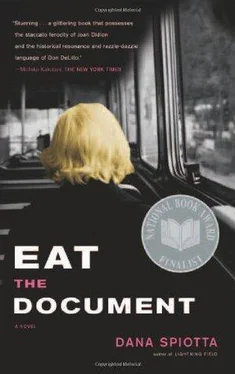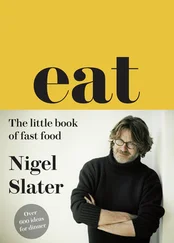“Jesus,” Miranda said. Josh came over with a big smirk on his face. He picked up a calendar with “Paris ’68” on the cover, and each month featured a different Situationist graffito. There were posters for Godard’s Le Petit Soldat and the remaster of The Battle of Algiers and a booklet of Weather Underground communiqués. A datebook with a cover photo of Bernardine Dohrn in a miniskirt holding a fist in the air. A vinyl shower curtain with a drawing of Subcomandante Marcos, and a note attached explaining the sales helped the Chiapas Zapatista movement. Ripped and safety-pinned clothes arranged in piles by boxes of vintage Doc Marten boots. And from a lacquered faux milk crate, Miranda pulled out little silk-screened patches meant to be pinned to shirts (never sewn!) that said “Sabotage” and “Anarchy,” exactly like the homemade patches the kids on the street wore. One even said “D.I.Y.” (Do It Yourself). She looked at Josh. “This is totally appalling.”
He smiled broadly. “This is the purity of capitalism. There is no judgment about content. You have to marvel at its elasticity, its lack of moral need, its honesty. It is the great leveler — all can be and will be commodified. Besides, what’s wrong with Emma Goldman being sold at the mall as a cool accessory? It is still Emma Goldman, isn’t it?”
“A confused context is the essence of alienation,” Miranda said.
“Who said that?”
“I did. I think,” Miranda said. She picked up a deck of playing cards. “New Left Series.” Each card had a different photo on the front, biography on the reverse. Dave Dellinger. Mario Savio. Abbie Hoffman. Mark Rudd.
“But you’re looking at it all wrong. See, capitalism can exploit your desire and exploit your need to subvert its exploitation of your desire. It revives — reinforces — itself on the blood of its critics and their critique. It embraces contradictions. It revels in irony.”
“No, that isn’t irony,” Miranda said. “That’s just cynicism. And it doesn’t contain contradictions. It just reduces everything to market value. It is simplistic and reductive. The irony is there for you because you are alienated from it but still live in it. The irony is yours, not the system’s.” Miranda looked sideways at Josh. “Or you used to be alienated from it but still live in it. Now you seem to revel in it.”
The “New Left” playing cards even came with instructions for a game to play using them,
Storm the Dean’s Office:
Watch out — if you put the wrong cards together,
there is a sectarian meltdown!
“Let’s take your little friend irony for one moment,” Josh said. “Irony can be the most subversive of stances. It has the potential to undermine and even to redress the hypocrisy and falseness of the culture. But that has become the favorite mode of the new corporate generation. Every ad you see. Even Republicans use irony now. So that leaves the earnest stance you love to use — so tedious, so”—Josh paused—“shrill and feminine,” he continued. “But guess what? It doesn’t matter. Not irony or earnestness or all the stuff in between — the earnest irony or ironic earnestness — can ever touch the perfect, all-powerful, underlying system.”
“That’s a very shallow reading of things. There is still a lot you can do to upset things. You are just talking yourself into something.” She turned over the deck of cards—$19.95.
“My treat,” Josh said.
“I don’t want them.”
“Well then, how about the Movement Rebels, Outlaws and Fugitives playing cards?” Miranda shook her head. “I’m getting them for you. I insist.” Josh took out a gold corporate American Express card and went to the register.
“When did you get that credit card?” she said.
He handed her the package. “You aren’t actually surprised, are you?”
“Actually, I am.”
“I got it with my promotion,” Josh said.
“I didn’t know you got promoted.”
“Didn’t I tell you? I think I must have told you. They loved my ideas for the franchised alternative community. I’m in charge of the whole thing.”
They reached the edge of the mall. The rain was pouring down on Broadway.
“I don’t have an umbrella,” she said.
“You can use my jacket. My car is parked three blocks down.”
“No.”
“Don’t be silly.”
“No, I don’t need it.”
“Okay,” Josh said. “I’ll get the car and bring it around. Just wait here.” Miranda stared at the rain. She watched him hurry down the street. What did she expect?
They drove across the freeway overpass on Eastlake hill. The city looked quiet and deserted, while the freeway was backed up beneath them. Miranda stared out the window. Josh kept looking over at her.
“I’m not going back to New York with you,” she said.
He started to laugh. “It is true that I enjoy making money, I won’t deny it. Thing is, I feel the same. I don’t think I am a materialistic person, you know. I never wanted stuff.”
She leaned her head against the window. Conversations in cars are the strangest, because you don’t look at each other even though you are sitting close enough to touch.
“What it comes down to is I just don’t want to look at other people’s garbage my whole life. There is always garbage blowing around the street outside our apartment. Life is too short. All I want is a clean, quiet place. Beauty and order and peace. If Allegecom contributes — as it most certainly does — to the world’s degradation, undermining, at least in a global sense, order and peace, as well as multiplying garbage, and — let’s face it — suffering, then it also mitigates, quite directly, my own contact with garbage and suffering.”
Miranda didn’t respond. She opened the pack of “Outlaw” playing cards. They were even worse than the other pack. On the front of each card was the photo of a person or the logo of a group. On the back were stats and facts about them done just like baseball cards. There were RAF/Baader-Meinhof cards, Red Brigade cards, as well as cards with individuals: David Gilbert. Katherine Power. Eldridge Cleaver. Miranda flipped through them absently. She stopped at a young man with long, curly hair and sunglasses. He had a familiar quality. She read the back. Bobby Desoto. Alt filmmaker and underground activist. Founded a collective, SAFE (Secret Attack Fear Effort), which allegedly planted bombs at the summer homes of corporate board members. Still at large. Miranda paused, then turned the card over. She stared at the mouth. That crooked smile. Of course. Of course.
“What are you looking at?”
“Nothing,” she said. “These cards are disgusting for so many reasons. If you can’t even see that—”
“Fine. Give them to me then.”
“No.”
“C’mon.” He took them out of her hand and put them in his jacket pocket. She stared out the window, arms crossed.
He reached over to her.
“Do not. I don’t like it,” she said.
He stopped the car in front of their hotel on Second Avenue.
“You’re wrong, you know,” Josh said, taking out the playing cards and waving them at her.
“What?”
“When you said a confused context causes alienation. But altering the context — appropriation — is subversive. Even liberating. Walter Benjamin said that about a thousand years ago.”
Miranda shook her head. “He was talking about art, not people.” She gestured wearily at the playing cards. “Those are human beings. Human beings do not need to be appropriated.”
NASH WALKED up John Street to a small bungalow-style house. The eaves hung far out beyond the edge of the porch. The curtains on the large front-facing window were drawn. He knocked. No answer.
Читать дальше












